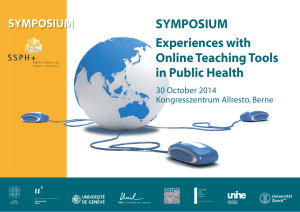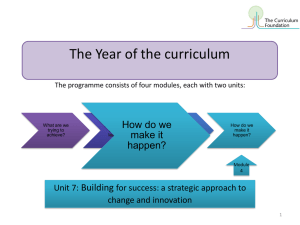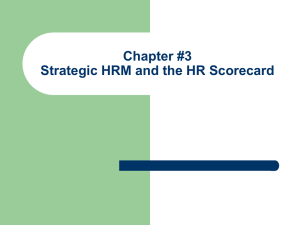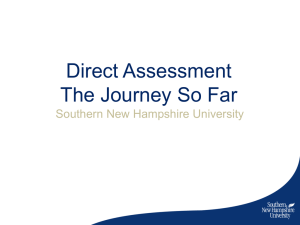Symposium for Teachers of Health Promotion and Community Health
advertisement
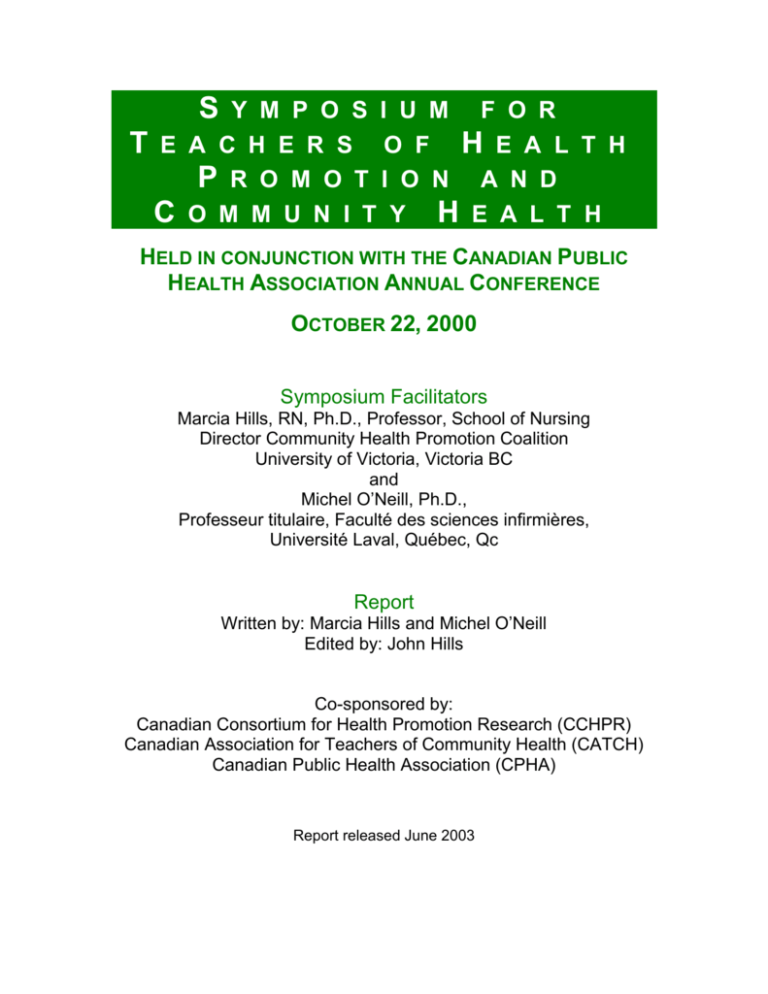
S Y M P O S I U M F O R T E A C H E R S O F H E A L T H P R O M O T I O N A N D C O M M U N I T Y H E A L T H HELD IN CONJUNCTION WITH THE CANADIAN PUBLIC HEALTH ASSOCIATION ANNUAL CONFERENCE OCTOBER 22, 2000 Symposium Facilitators Marcia Hills, RN, Ph.D., Professor, School of Nursing Director Community Health Promotion Coalition University of Victoria, Victoria BC and Michel O’Neill, Ph.D., Professeur titulaire, Faculté des sciences infirmières, Université Laval, Québec, Qc Report Written by: Marcia Hills and Michel O’Neill Edited by: John Hills Co-sponsored by: Canadian Consortium for Health Promotion Research (CCHPR) Canadian Association for Teachers of Community Health (CATCH) Canadian Public Health Association (CPHA) Report released June 2003 S T P E A K T O E A C H I N G U … S O F Then said a teacher, speak to us of teaching. And he said: No man can reveal to you aught but that which already lies half asleep in the dawning of your knowledge. The teacher who walks in the shadow of the temple, among his followers, gives not of his wisdom but rather of his faith and his lovingness. If he is indeed wise, he does not bid you enter the house of his wisdom, but rather leads you to the threshold of your own mind. The astronomer may speak to you of his understanding of space, but he cannot give you his understanding. The musician may sing to you of the rhythm which is in all space, but he cannot give you the ear which arrests the rhythm nor the voice that echoes it. And he who is versed in the science of numbers can tell of the regions of weight and measure, but he cannot conduct you thither. For the vision of one man lends not its wings to another man. And even as each of you stands alone in God’s knowledge, so must each one of you be alone in his knowledge of God and in his understanding of the earth. Kahlil Gibran R E P O R T A one day bilingual symposium for teachers of health promotion and community health was held on October 22, 2000, in Ottawa, Ontario, Canada, in conjunction with the annual general meeting and conference of the Canadian Public Health Association. The goal of the symposium was to provide opportunities to network, to discuss and debate issues, and to develop strategies to address priority issues in teaching health promotion and community health. Marcia Hills from the University of Victoria and Michel O’Neill from Université Laval facilitated the symposium. B C S A C K G R O U N D A N D O N T E X T F O R T H E Y M P O S I U M In 1998, the Canadian Consortium for Health Promotion Research (CCHPR) Subcommittee for Education and Training conducted a survey of health promotion courses and programs in Canadian universities. The report of this survey contained several recommendations for future education and training in health promotion. Two main initiatives were identified as priority areas: enhancing communication among educators of health promotion in Canada and hosting national symposia for teachers of health promotion. As a result, a bilingual listserv (HPSEDUC) was established in 2000 and a series of national symposia were launched. Symposium 1: Paradoxes, Pedagogy & Pragmatics: Teaching Health Promotion in the New Millennium The purpose of this event was to provide opportunities for educators across Canada to engage in critical dialogue about their teaching practices and experiences. The symposium was held in conjunction with the Canadian Public Health Association national conference in Winnipeg on June 6, 1999. This symposium was co-sponsored by Health Canada, the Canadian Consortium for Health Promotion Research, the Canadian Association of Teachers of Community Health (CATCH) and the Canadian Public Health Association. Twenty-five people attended the symposium from a variety of educational programs across Canada. Using a combination of plenary sessions, small working groups and large group interactions the following questions were explored: ★ Is there core Health promotion knowledge and if so, what should it be? ★ What constitutes a health promotion curriculum? ★ Who are the teachers of health promotion? ★ How can health promotion integrate the social determinants of health and the biomedical approach to health? ★ How does the science of action and emancipatory teaching address the paradoxes embedded in teaching health promotion? What does it mean to teach diversity? ★ How do we teach diversity? ★ How can we address the need for supporting and valuing health promotion? ★ How do we reconcile teaching/learning health promotion in the classroom with the realities of working in the health care field? Four learning activities were created to engage participants in the exploration of these questions. The first activity focused on the identification of paradoxes that exist in health promotion that impact on teaching it. The second activity engaged participants in a process of developing a pedagogical framework that was consistent with health promotion. The third activity was designed to discuss challenges that educators face when teaching health promotion and to create strategies to deal with these challenges. The challenges that were identified in the survey by teachers of health promotion across Canada were used as the basis of the discussion. Many of the participants who attended this symposium reported that it was the first time that they had had the opportunity to discuss issues that were of critical importance to them. Their evaluations requested a similar event be held the following year with the recommendation that the next symposium focus on pedagogical frameworks and core competencies for health promotion. SYMPOSIUM OBJECTIVES The 2000 symposium aimed at offering the possibility to the group, composed of about a dozen of people teaching in a variety of contexts and institutions, to exchange over key questions pertaining mainly to the idea of core competencies in health promotion. SYMPOSIUM METHODOLOGY The meeting was very interactive and, after an introduction by the facilitators, was organised around the three learning activities described below. The possibility to operate in both French and English was not utilised by the participants who felt comfortable to function in English only. KEY QUESTIONS The following questions guided the discussion during the seminar: Are there core competencies in health promotion? If so, what are they? What are the pros and cons of using a competencybased approach in health promotion courses and programs? Are the knowledge, skills, and attitudes that are required by undergraduate and by graduate students the same? Are the knowledge, skills, and attitudes that are required by practitioners and by researchers the same? What are the currently used pedagogical practices of people teaching health promotion? How consistent are our current pedagogical practices with the philosophy and principles of health promotion? Should our pedagogical practices be altered to reflect the health promotion practices of the future? EXPECTED OUTCOMES It was expected that the symposium would: Allow people who teach in health promotion to exchange around their practices. Foster networking among the participant and others who could not attend. Be an event in a series to be pursued according to need. Help CATCH to revitalise. SYMPOSIUM AGENDA Sunday 22 October 2000 0900-0915 0915-0930 0930-1030 1030-1045 1045-1200 1200-1300 1300-1415 1415-1430 1430-1530 1530-1600 Welcome, Introductions, Background and Overview of the day Setting the Context: An Emancipatory Curriculum Paradigm for Health Promotion Learning Activity 1: Pros and Cons of Using Core Competencies to Develop Courses or Build Curricula in Health Promotion (Speakers / Small Groups / Plenary) Refreshment Break Learning Activity 2: What are the knowledge, skills and attitudes that practitioners will need to practice health promotion in this new century? (Small Working Groups) Lunch Learning Activity 3: Pedagogical Frameworks and Strategies for Teaching Health Promotion Refreshment Break Plenary Closure and Evaluation INTRODUCTORY COMMENTS Marcia and Michel introduced themselves and made a few welcoming remarks. Michel discussed participants’ preference for language usage and it was decided that the symposium would be conducted in English with translation to French as requested. Participants were encouraged to ask questions either in French or in English. Michel gave an overview of the day and reviewed the materials that the participants had received in their learning packages. Each participant also received a complimentary copy of a special issue on Education and Training from the International Union for Health Promotion and Education (O’Neill and Hills, 2000). SETTING THE CONTEXT: PROPOSING AN EMANCIPATORY FRAMEWORK FOR DEVELOPING HEALTH PROMOTION CURRICULUM Marcia set the context by presenting a framework for developing health promotion programs that is based on an empowering and emancipatory educational paradigm. She argued that a framework that is to be used to develop health promotion programs needs to be congruent with the principles and philosophy of health promotion. She reviewed the most commonly used definition of health promotion from the Ottawa The World Health Organization defines health promotion as Charter and she “a process of enabling people to increase control over and to described the improve their health…a mediating strategy between people key concepts and their environments, combining personal choice with that she felt social responsibility for health” (Charter, 1986). were embedded in this definition. The WHO definition presents a socio-ecological view of health. EMBEDDED CONCEPTS Marcia identified three critical concepts that are integral to health promotion and that are derived directly from the WHO definition of health promotion: the primacy of people, empowerment and enabling. Primacy of People Health promotion is, first and foremost, about people. People are at the heart of all health promotion practice, education, and research. Acceptance of this premise means adherence to certain assumptions that underlie it, including: valuing and caring for the person not the disease, believing that the relationship with the person is at the core of health promotion practice, and realizing that people are always situated in time and place and therefore are influenced by their social, political, and historical contexts. Empowerment Empowerment is the heart of health promotion as is reflected in the definition words “…the process of enabling people to increase control over”. To empower people does not mean to give them power; nor does it mean that they take power. The act of empowering is “…a relational act of power taken and given in the same instance” (Labonte, 1993, p.49) where power and control are negotiated. How power is exercised is a fundamental issue to be negotiated. Health professionals always have opportunities to create power with relationships or power over relationships. Power over relationships are created when health professionals value their own knowledge over citizens’ knowledge and when the health professionals believe that they know what is best for the other. On the other hand, power with relationships are created when health professionals listen and act on citizens’ knowledge and experiences. Enabling Enabling refers to the “process” aspect of health promotion by recognizing that, while people may have capacity for exercising control over factors that affect their health, they do not always have and may need to acquire the requisite attitudes, knowledge and skills. Therefore, teaching and learning are important aspects of health promotion. Similar to the considerations of power and control, the teaching learning process in health promotion should be relational not hierarchical. Enabling is referred to at times as capacity building; however, this terminology implies that people lack capacity. A first step in relational teaching/learning is an acknowledgement of people’s knowledge, experiences and abilities. AN EMANCIPATORY CURRICULUM PARADIGM FOR HEALTH PROMOTION PROGRAMS By way of comparison, Marcia presented a curriculum development framework based in a traditional educational paradigm (Tyler, 1949). This framework for curriculum development is based on behavioural educational principles and is widely used by many disciplines to develop curricula. A Curriculum Development Framework Based in a Behavioural Educational Paradigm Tyler’s (1949) curriculum development process is linear and consists of the following steps: Define program purpose Develop program goals and objectives Decide on curriculum threads and levels Develop course Write course learning objectives Develop lesson plans Write learning objectives for each lesson Develop evaluation strategies to measure objectives Marcia contrasted this behavioural framework to one based in an emancipatory paradigm. Emancipatory curriculum frameworks are built on the ideas of Carl Rogers, Arthur Combs, Paulo Freire and others. Inherent in an emancipatory curriculum paradigm is a community development approach that is participatory, iterative, and interactive. This paradigm incorporates the following the guidelines. A Curriculum Development Framework Based in an Emancipatory Educational Paradigm Develop a vision Systematically ascertain what knowledge, skills and attitudes are required for future practice Pose futuristic questions Involve stakeholders (practice, administration, policy makers, etc) Do a thematic analysis of responses Develop a master grid of the themes Decide on courses based on themes Develop course outlines Involve stakeholders in writing course outlines Contents of Course Outlines: Ends-in view Resources Process Develop learning activities Re-examine grid for health promotion themes to synthesize the courses in each term using health promotion terminology Develop evaluation strategies that are consistent with health promotion. Note that, because an emancipatory curriculum framework is also based on the principles of community development and action research, there is full participation by all stakeholders at all stages of development. This results in a dialectical movement so that what is developed is understood to be evolving and not static. Marcia then described the assumptions that underlie these two different paradigms for curriculum development. The assumptions are outlined in the following table. COMPARISON OF BEHAVIOURAL AND EMANCIPATORY CURRICULUM PARADIGMS Behavioural Views Of Teacher Views Of Learner expert; having answers passive recipient of knowledge View Of Curriculum set of courses Teaching Strategies lectures Goal to meet objectives Emancipatory co-learner; strategist active participant discovery of meaning dialogue between & among teachers and students learning activities integrate experiential knowing with theoretical knowing to liberate These introductory remarks completed, the first learning activity was launched. L E A R N I N G A C T I V I T Y 1 PROS AND CONS OF USING CORE COMPETENCIES TO DEVELOP COURSES OR BUILD CURRICULA IN HEALTH PROMOTION Internationally, many educators are beginning to identify core competencies for health promotion practice, usually through several rounds of consultation among practitioners, and to use these competencies as the basis upon which to plan and develop courses and programs in health promotion (See for instance P&E, 2000). There is considerable debate about the advantages and disadvantages of this approach. The purpose of this activity is to examine the relative merits of using a competency-based approach to health promotion course and curriculum development. Michel O’Neill (Université Laval) and Doug Wilson (University of Alberta) each gave a 10-minute presentation to set the stage for discussion. Doug highlighted the advantages of using a core competencies approach to developing health promotion courses or building a health promotion curriculum. Michel described the disadvantages. Doug began by outlining the advantages of using this approach. Doug suggested that competencies can provide a common language for health promotion educators throughout the world and there is a demand for the creation of these competencies. Competencies can assist teachers to know what to teach. Doug stated that competencies that are used as guidelines with some flexibility can be very helpful in developing curricula and courses. Michel, building among other things on Marcia's previous work in Brazil (Hills, 2000, p.13), listed the following potential disadvantages and difficulties: How to identify competencies if there is no formally recognised professional body of health promoters? If such a professional body exists, there is a danger to exclude others who have developed competencies and to threaten multidisciplinarity. Deciding on specific competencies may slow down the development of new practices in a field that is still young. The processes to identify the competencies are very time consuming and complex, as well as the translation of the competencies, once identified, in courses and programs. Such exercises may expose the profession to external control and judgement. It might create a dilemma about health promotion being a field in itself or just part of another field, potentially weakening its legitimacy. For some, the values of health promotion that are participatory seem incompatible with the normative approach of a competency-based approach. The threat that such an approach limits the practitioners' freedom of intervention. The perception that it is reductionist, that it excludes other approaches. The possibility it makes more difficult to keep the broader picture in mind. Following the presentations, the participants were asked to work in small groups to; discuss their reactions to the views that had been presented, describe experiences that they may have had using core competencies, and decide on the usefulness of the core competencies approach. They were also asked to be prepared to share their opinions with the large group. After the work of the breakout groups, Michel facilitated a discussion on the usefulness of competence-based course and curriculum development. The discussion was lively and the participants presented a variety of views and experiences. The group concluded that competencies could be limiting if they were narrowly defined or rigidly adhered to. Participants expressed that competencies could be useful if they were broadly defined and thought of as guidelines. Some group members recommended caution in using this approach because they had a had experiences where competencies were intended to be viewed broadly or used as guidelines but, in fact, had come to be held rigidly. L E A R N I N G A C T I V I T Y 2 WHAT ARE THE KNOWLEDGE, SKILLS AND ATTITUDES THAT PRACTITIONERS WILL NEED TO PRACTICE HEALTH PROMOTION IN THIS NEW CENTURY? Marcia initiated this learning activity by suggesting that, instead of building courses and curricula based on competencies, an alternative might be to identify the knowledge, skills and attitudes that practitioners need to practice. Such a strategy would be consistent with an emancipatory educational paradigm. She explained that the purpose of the learning activity was to identify the knowledge, skills and attitudes that the group believed were necessary for future practitioners to practice health promotion effectively. The participants were asked to work in groups of approximately five. Participants were asked to consider the following questions: Knowledge – What will practitioners need to know to practice health promotion in this new century? Skills – What will practitioners need to be able to do to practice health promotion in this new century? Attitudes – How will practitioners need to be to practice health promotion in this new century? The participants were asked to list the knowledge, skills and attitudes on separate flip charts and to prepare themselves to share their views with the large group. The questions and the answers generated by the groups are described in the following tables. What Knowledge? What do you need to know to practice HP in this new century? Group 1 Group 2 Group 3 determinants of health anthro Theory change social/political/econo don’t re-invent the wheel individual mic context and – know lit and history social systems and power health promotion Strategies for change relations strategies health system organizing Political context determinants of Experiential knowledge public health basics behaviour knowledge for advocacy understanding the social determinants of audience and partners impact of socio-economic environment – social justice applied epidemiology, statistics health processes of change/development personal, institutional organizing, community/social People – why they must be at the centre of practice how to make people the centre about power – how it works/effects primary documents – history and background basic concepts – learning and change on individual and community societal groups relationship building – why and how communications for building change strategies individuals groups self knowledge to move forward What Skills? What do you need to be able to do to practice HP in this new century? Group 1 Group 2 Group 3 information gathering lit to do check connect to critical thinking review, internet use, know att volumes deepening social key informants how to enable people to analysis process skills – planning, participate fully/high Basic communication advocating level skills facilitation, evaluation walk the talk Interpersonal skills – in depth area practice, practice, empowerment anime – different practice (see Luiz for enabled disciplines example) Computer literacy identify strengths and interpersonal relationship Competent consumer of differences and bldng research effectively bring to team work, interdisc. common goal Evaluation skills written, documentation for gaining resources and Continuous learning sharing with others money, public, private advocacy of health (many ways) proposal writing promotion planning and evaluation research, critical thinking Analysis of external spectrum forces communications skills – facilitation skills verbal and written negotiation, mediation merging theory and mobilization practice people/resources critical reflection (self) advocacy and change (critical critical thinking subjectivity) organization/management value innovation – motivation and creativity expressed engagement in actions listening, observing information gathering uncovering power relations managing power relations consciousness raising What Attitudes How do you need to be to practice HP in this new century? Group 1 Group 2 Group 3 Cadeaux stance/posture Hierarchy vs. Participatory credibility Learners – way of think – value Holistic change agent care about people Tolerance – difference – adaptability primarily uncertainty optimistic / positivist particip/democratic Accountability vs. (critical accessibility thinking, reflexivity) managing/levelling power empathy structure Individual in community affability reflective/analytical/critical equity, social justice useful openness to others and Lifelong learning Flexibility – to give up their ideas, values, respect – positive regard control practices trust Power with rather than reciprocity power over self awareness – humility Value diversity – much to – confidence gain (personally) Values/Principals interdisciplinarity valued People first centred inherently political recognize that maturity – life experience knowledge, skill, value social justice, attitudes equity, ethics circular/connected/rel ated The groups’ flip chart lists of ‘what knowledge’ was hung together on a wall, as were their lists of ‘what skills’ and ‘what attitudes’. The participants were asked to join with one or two others and to walk around the room reading and discussing the lists. They were asked to write on “post-it notes” any themes that they noticed that seemed to reoccur as they read the different lists and to place the notes on another flip chart under the appropriate title of Knowledge, Skills, or Attitudes. Michel facilitated a discussion about the themes that were generated. Participants expanded on the themes and similar themes were grouped together. The following table describes the syntheses of these themes in each category – Knowledge, Skills, and Attitudes. Knowledge understanding behavior at large basic concepts tolerance people, experiencial people centred when and how theory process of change change – individual, social social political context community assessment determinants of health background – history, philosophy Skills critical reflection critical reflexivity theory and practice critical thinking reflective practice information gathering communication skills (interpersonal skills) process skills (planning etc) creativity power politics and influence Attitudes Change Agent Credible Adaptabilité Disponibilité Empathie affabilité utilité Accept and value differences adaptability accountability lifelong learning tolerance participatory equity social justice valued reflective people centred power sharing power with vs. power over L E A R N I N G A C T I V I T Y 3 PEDAGOGICAL FRAMEWORKS AND STRATEGIES FOR TEACHING HEALTH PROMOTION Marcia began by clarifying the meaning of pedagogy. She stated that many people think of pedagogy as how teachers teach. She suggested that this was a limited view of pedagogy and that she considered Lustig’s definition to be more comprehensive. “Pedagogy addresses the transformation of consciousness that takes place at the intersection of three agencies – the teacher, the learner, and the knowledge they together produce” (Lustig, 1986). As she explained, this conceptualization opposes the idea that the teacher is a neutral transmitter of knowledge or that the student is a passive recipient of the teacher’s knowledge. It also rejects the notion that knowledge is static information to be imparted. Rather, this view of pedagogy highlights the importance of the relationships and the means by which knowledge is created. Marcia introduced the learning activity by reminding the group of the assumptions that underlie an emancipatory educational paradigm for developing health promotion programs as presented in introduction to the symposium. She suggested that the pedagogical frameworks that we use to teach health promotion should also be consistent with health promotion philosophies and principles. For emphasis, she contrasted a behavioural pedagogical framework with an emancipatory one. In a behavioural educational paradigm students are seen as passive recipients of teachers’ knowledge. The teacher decides what knowledge the students need, how it will be transmitted – lecturing being the primary mode of transmitting knowledge in this paradigm - and how that knowledge will be evaluated. Marcia highlighted the difference between the behavioural and emancipatory educational paradigms by presenting her pedagogical framework. In this framework, the teacher creates a collaborative relationship with the students so that together they can engage in critical dialogue that transforms the consciousness of both the teachers and the students and results in the co-creation new knowledge. Students are provided with practical experiences and critical dialogue is used to create reflection in action. These three critical aspects – creating collaborative relationships, engaging in critical dialogue and reflection in action - are responsible for the transformation of consciousness to knowledge. Marcia then reviewed the instructions for Part A of Learning Activity 3. She explained that the purpose of this activity was to develop a pedagogical framework that would be consistent with health promotion. Three groups of approximately 5 participants each were asked to identify, as a group, what each considered to be the essential elements of health promotion pedagogy. They were to discuss how the elements were related to each other and finally they were to draw a representation of their model on a flip chart. Each group shared its representation with the larger group by interpreting the models and explaining the significance and relationship of the elements. Facsimiles of the drawings are included in appendix A. Michel facilitated a discussion of the various models and their congruence with an emancipatory paradigm and of issues that had been raised while doing the learning activity. Marcia subsequently introduced Part B of the learning activity. Participants were asked to consider strategies for teaching health promotion. They were asked to identify and list specific strategies that they had used or that they could use that were or would be based on the pedagogical frameworks that were depicted in their representational models. They were asked to be prepared to explain how the strategies are consistent with their frameworks. The following list was generated. Teaching Strategies include practitioners in T/L situations “joint” agenda setting – (complexity – time constraints) consult with “former” students – (and others) (recognize that no class is the same) orient students to critical pedagogy (teachers’ beliefs and values – transparent) – come clean don’t fill the agenda – allow for flexibility and emerging issues The group discussion then turned to issues of evaluation in teaching/learning situations. The following points were considered and discussed. Evaluation negotiate evaluation choice of the way one is evaluated choice weighting of assignments choice when assignments are due provide menu of possibilities use contract grading use learning contract for program use portfolios give credit for doing the work day by day evaluation value listening and learning from others Evaluation of the Workshop Overall, the participants seemed very pleased by the symposium and suggested that others be held. The pros and cons to organise them in the context of CATCH and as back-to-back sessions with the CPHA conference were alluded to and proposals for improved processes suggested. REFERENCES Bevis, E & Watson, J. (1991). Toward a Caring Curriculum National League of Nursing : New York. Charter (1986). The Ottawa Charter for Health Promotion; Ottawa; Canadian Public Health Association; Health and Welfare Canada; World health Organization. Gibran, K. (1923). The Prophet. Knopf: New York Hills, M. (2000); Report of a workshop for teachers of health promotion, 6th Brasilian congress on collective health, Campo Grande, August 2000. Labonte, R. (1993). Health promotion and empowerment: Practice frameworks. Toronto: Centre for Health Promotion/ParticipAction. Lustig, G. (1986). In Like and Gore, Feminism and critical pedagogy. New York: Routledge, pp120-137. O'Neill, M., & Hills, M. (2000). Education and training in health promotion and health education: Trends, challenges, and critical issues. Promotion and Education, 7(1), 7-9. P & E (2000); Special issue of Promotion and Education, 7(1) on training and education in Health Promotion, Michel O’Neill and Marcia Hills, guest editors Tyler, R.W. (1949) Basic Principles of Curriculum and Instruction; Chicago; U of Chicago Press Appendix A Representations of Pedagogical Frameworks




